Women's World Cup 2019: Nearly one million tickets sold as France set to open tournament
- Published
Women's World Cup 2015 final highlights: USA 5-2 Japan
Fifa Women's World Cup |
|---|
Host nation: France Dates: 7 June - 7 July 2019 |
Coverage: Live across BBC TV and Red Button, Radio 5 Live & Sports Extra and the BBC Sport website & App |
The eighth Women's World Cup begins in France on Friday with nearly a million tickets sold for the tournament.
England and Scotland are among the 24 teams taking part and will face each other in their first match in Group D in Nice on Sunday (17:00 BST).
Hosts France will meet South Korea at a sold-out Parc des Princes in Friday's opening game in Paris (20:00).
Defending champions the United States get their campaign under way against Thailand on Tuesday, 11 June.
Six groups of four teams will compete for the 16 places in the knockout phase, on the road to the final on Sunday, 7 July in Lyon.
VAR, the video assistant referee system, will be used in the tournament for the first time, while the £24m awarded to participating teams in 2019 is double the amount of 2015, albeit a long way short of the £315m prize pot at the 2018's men's World Cup.
A total of 950,000 tickets have been sold so far for the month-long tournament.
Who are the favourites?
The United States and France start the tournament as the slight favourites, ahead of two-time champions Germany and England, who are ranked third in the world.
European champions the Netherlands, 2011 winners Japan and 2016's Olympic silver-medal winners Sweden are among the other strong contenders, as well as Canada and Australia, who are ranked fifth and sixth in the world respectively.
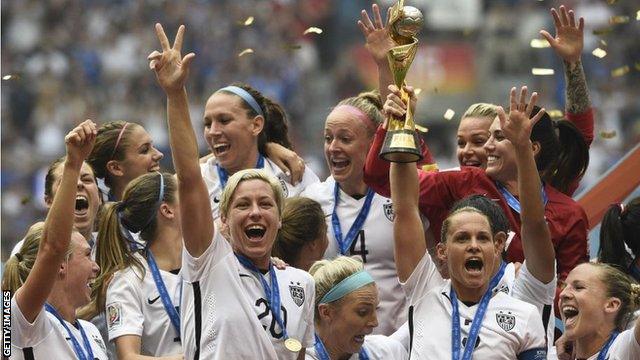
Carli Lloyd scored an incredible 13-minute hat-trick as the United States thrashed Japan 5-2 to win their third Women's World Cup title in 2015
The Americans are bidding to win the title for a record fourth time, while France are aiming to become only the second host nation to lift the trophy, after the USA's triumph on home soil in 1999.
Scotland are among four nations making their debuts at the tournament, along with outsiders Chile, Jamaica and South Africa.
Who are the star players to watch?
USA forward Alex Morgan and Australia's Sam Kerr - the record goalscorer in America's professional league - are among the stars expected to shine on the global stage.
England will hope that their captain Steph Houghton, right-back Lucy Bronze and the Football Writers' Association's Player of the Year, winger Nikita Parris, can shine, while young Chelsea midfielder Erin Cuthbert has been tipped to enjoy a breakthrough tournament for Scotland.
Brazil's six-time World Player of the Year Marta will be looking to add to her all-time record of 15 goals at Women's World Cups, while towering centre-back Wendie Renard is one of three France players who have won the Women's Champions League six times since 2011.
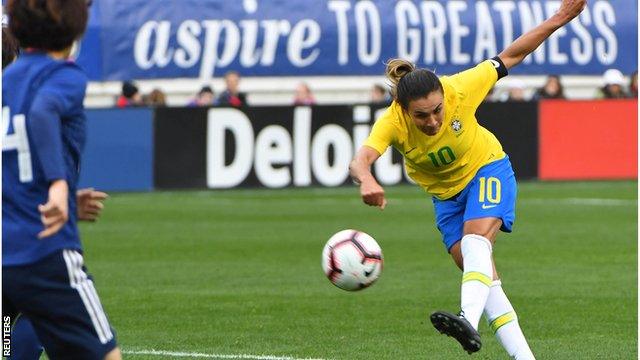
The biggest prizes have eluded Brazil's Marta - she lost in Olympic finals in 2004 and and 2008, and was a World Cup runner-up in 2007
Spain's Jennifer Hermoso arrives at the tournament after helping Atletico Madrid pip Barcelona to win their domestic league title, while the Netherlands and Arsenal striker Vivianne Miedema won the Golden Boot in England's top division last season.
However, the inaugural Women's Ballon d'Or winner, Norway's Ada Hegerberg, will not be at the event, less than a month after she scored a hat-trick in the Champions League final.
The Lyon striker, who was voted by fans as the BBC's Women's Footballer of the Year for 2019, is taking a stand against what she feels to be a lack of respect for female players in her country.
What are home nations' chances?
England finished third at the 2015 tournament in Canada and are aiming to win their first major tournament, under the management of their head coach, the former England, Manchester United and Everton full-back Phil Neville.
Shelley Kerr's Scotland, ranked 20th in the world, have qualified for the finals for the first time.
Members of England's Lionesses squad share some secrets about themselves
The two neighbours similarly met in their opening match of the 2017 European Championships, which saw the Lionesses win 6-0 and go on to reach the last four.
But since then Scotland's players have begun training on a full-time, professional basis and they have welcomed back a number of stars who missed Euro 2017 through injury, including playmaker Kim Little and her Arsenal team-mate, centre-back Jen Beattie.
The other teams in Group D are Argentina and 2015's runners-up, Japan, with two teams from each group guaranteed to qualify for the last 16, as well as the best four of the six third-placed sides.
Watch: Your Scotland World Cup squad
Where are the games being held in France?
There are nine stadiums hosting matches in nine different cities across France, including the capital Paris, which will stage Friday's opening ceremony before the first game.
Both the semi-finals and final will be played at the Stade de Lyon in the south-east of the country.
It is the largest of the nine stadiums involved, while Grenoble's Stade des Alpes - which will host five matches - is the smallest, with a capacity of 20,068.
The nine venues are:
Parc des Princes, Paris
Stade Auguste-Delaune, Reims
Stade des Alpes, Grenoble
Roazhon Park, Rennes
Stade du Hainaut, Valenciennes
Stade de la Mosson, Montpellier
Stade de Nice, Nice
Stade Oceane, Le Havre
Stade de Lyon, Lyon
The opening match, along with the semi-finals and final, were sold out within 48 hours of going on general sale.
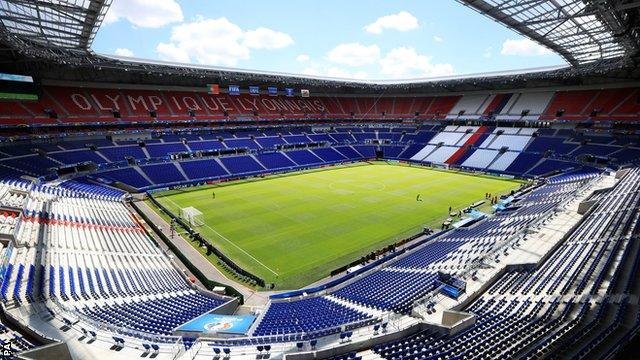
The Stade de Lyon has a capacity of 59,000
How much anticipation is there in France?
Organisers have been criticised for a perceived lack of visible promotion for the tournament around Paris, amid the climax to the ongoing French Open tennis grand slam tournament in the capital.
Responding to questions about efforts to raise awareness of the opening game, Erwan Le Prevost, the chief executive of the World Cup's Local Organising Committee, said: "It depends what you are expecting from posters.
"The main aim is to fill the stadiums and to have the biggest TV audience possible. Three of the seven matches that will be played here [in Paris] are sold out.
"Rather than covering a huge city, we preferred to focus on two spots, the Parc des Princes and the Chatelet district of Paris."
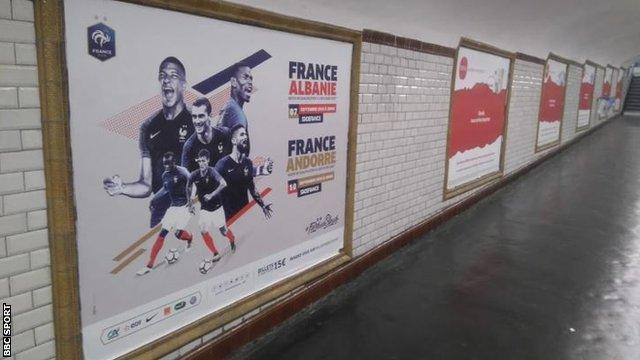
Adverts for the France men's upcoming internationals with Albania and Andorra have appeared to be more prominent around Paris than promotional material for the Women's World Cup
Jean-Francois Pathy, director of marketing services at Fifa, added: "Of course we can do better but it's a tremendous improvement from where we were in the past."
In total, 950,000 tickets have been sold so far, according to Le Prevost, who added: "On [Wednesday] we sold 6,500 tickets in just one day."
Lyon's 57,900-capacity stadium has sold out for all the matches it is staging at the conclusion of the tournament.
How to follow, watch and listen to the games across the BBC
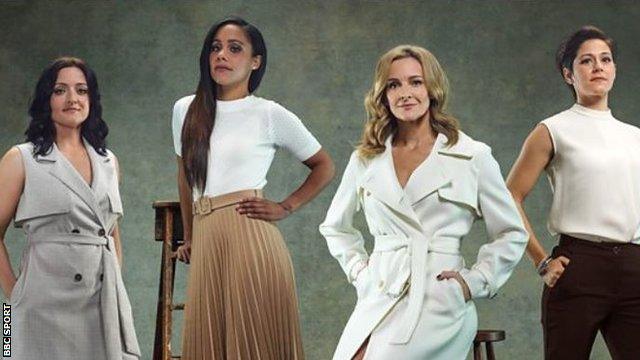
BBC Sport will have live coverage of every World Cup match across TV, radio, the Red Button and online from the group stages all the way through to the final
BBC Sport will provide extensive coverage of the tournament across television, radio, online and the BBC Sport app, with live coverage of every match from the group stages all the way through to the final.
The opening fixture will be shown live on BBC One from Paris, with England and Scotland's meeting on Sunday among the other games that will be shown on BBC One.
The final is also being shown on BBC One from 16:00 BST on Sunday, 7 July.
BBC Sport has launched #ChangeTheGame this summer to showcase female athletes in a way they never have been before. Through more live women's sport available to watch across the BBC this summer, complemented by our journalism, we are aiming to turn up the volume on women's sport and alter perceptions. Find out more here.